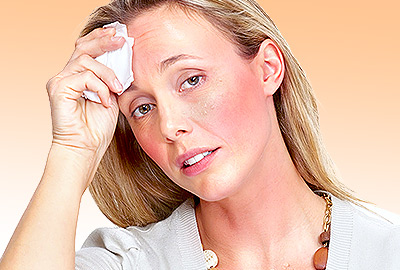
Menopause is a natural part of life that occurs in most middle aged women, with symptoms beginning as early as their forties. Of all of the potential menopause symptoms, hot flashes are one of the most common. Usually accompanied by profuse sweating, hot flashes can last anywhere from a few seconds to several minutes. Although their exact cause is unknown, hot flashes are likely due to fluctuating hormone levels.
Often the thought of dealing with hot flashes in a crowded setting can bring on anxiety or even worse increase the intensity of a flash. However, there are ways to cope. Read on to learn more about finding relief from hot flashes in busy places.
Beating Hot Flashes in Crowded Places
Dress in layers

Stay cool to minimize the onset of hot flashes by wearing light, breathable fabrics, and by wearing layers. That way, if you feel a hot flash coming on, you can remove one of your layers and stay comfortable. Be sure to have room in your purse to carry extra clothes, should you need to remove a layer.
Breathe deeply
Three deep breaths or a soft mantra repeated quietly to yourself can help relieve stress, which is one of the strongest triggers for hot flashes. Try counting to ten when you start to feel stressed. This can help you to focus your mind on staying relaxed and take your mind off of the stressful situation.
Limit caffeine

Although it may be tempting to head to your nearest coffee shop to help calm your nerves, it's better to avoid the caffeine altogether. Caffeine acts as a stimulant, which directly affects the nervous system. This can trigger many menopause symptoms, including mood swings and hot flashes. Instead, try drinking a cool beverage, such as water or lemonade. This will lower your body temperature, which will decrease the duration and frequency of your hot flashes.
There are plenty of options for treating your hot flashes. Talk to your doctor about which treatment method is best for you.
Sources
- Boston Women's Health Collective. "Hot Flashes, Night Sweats, and Sleep Disturbances." Our Bodies, Ourselves, 2006.
- The National Institute of Health.(n.d). "Signs of the Menopausal Transition." Retrieved from www.nih.gov.
- Von Muhlen, DG, et al. "A community-based study of menopause symptoms and estrogen replacement in older women." Maturitas. Sept 1995; 22(2): 71-8.



